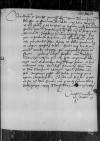Letter #3510
Venceslaus WILHARTICZ to Ioannes DANTISCUSPrague, 1531-05-21
| received Ghent (Gandavum), [1531]-06-06 Manuscript sources:
| ||||
Text & apparatus & commentary Plain text Text & commentary Text & apparatus
Reverendissimo Domino, domino
Commendationem et servitiis praemissis.
Reverendissime Domine, domine mi observan(de) or observan(dissime)⌈observan(de)observan(de) or observan(dissime)⌉
Debuissem ex officio meo iam dudum aliquid Reverendissimae Dominationi Vestrae scripsisse, ut vel gratum pro tot beneficiis et singulari eiusdem benevolentia hominem agerem, impediverunt tamen h{e}ae nostrae cum
Habemus nobiscum frequenter nostrum
Commendo me Rverendissimae Dominationi Vestrae et peto, ut sim etiam domino
Datae


 BCz, 1595, p. 256
BCz, 1595, p. 256